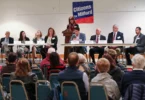By Aryan Rai
Boston University News Service
At the “An Evening for Fair Housing” event, organized by the Boston Office of Fair Housing and Equity, discussions concerning Boston’s historical segregation of communities through housing and zoning were heard, along with the city’s plans to alleviate the problem it helped create.
Speakers at the Oct. 28 event explained the past, present, and immediate future of Affirmatively Furthering Fair Housing, a provision included in the Fair Housing Act of 1968.
It mandates that “all executive departments and agencies shall administer their programs and activities relating to housing and urban development in a manner affirmatively to further the purposes of fair housing.”
Dr. David Harris, a lecturer at Harvard University, and the founding executive director of the Fair Housing Center was the first speaker up, talking briefly about the Kerner Commission Report published in 1968, which concluded the U.S. was “moving toward two societies, one black, one white— separate and unequal.”
He also talked about Boston’s history of redlining neighborhoods and disproportionate infrastructural growth rooted in racism which he noted is the “main issue.”
“It is like a door that is closed to many and open to some,” Harris said. “And policies are oriented towards opening that door. But that is inadequate. There is a wall holding up that door, and that wall is racism and inequality. If we are going to have any effect, we have to tear down that wall.”
Harris also highlighted the roles previous U.S. presidents and their administrations played — the Obama administration consolidating the AFFH with a 2015 rule that “requires communities receiving HUD funding to use HUD-provided data to identify potential local fair housing issues, and then to develop approved goals to address these issues.”
The Trump administration, in contrast, moved to repeal the 2015 regulations.
Also discussed during the event was a policy document that the city of Boston and the AFFH Community Advisor Committee drafted together which “created goals that addressed issues identified by the community.”
The draft was based on a comprehensive community-driven “Assessment of Fair Housing” report that highlights and analyzes the many issues that the protected classes face.
The document is awaiting adoption by the current mayor and an executive order directing the city departments to implement the listed goals.
It was also pointed out that Boston became the first city in the country to include AFFH in the city’s zoning code in 2020 via a city council’s vote. The campaign was spearheaded by Councilor Lydia Edwards who was also the keynote speaker for the evening.
Edwards delved into the importance of AFFH and how it is the way forward in reconciling mistakes of the past and bridging Boston and its communities.
“Essentially, you just can’t hope it happens. You can’t just say ‘Don’t remove or don’t exclude.’ We must take affirmative steps to actually integrate our communities,” said Edwards.
She noted that the assessment report was needed to point out the “pain points” in the community and set accurate goals. Edwards, who proposed the zoning amendment in April 2019, further talked about why zoning was the area she focused on.
“Zoning is the least sexy thing you will find,” she said. “But it is also the most powerful tool that the local governments have because it covers both the private and the public sectors at the same time.”
As Edwards explained, under the new amendment, project developers must now include three things when submitting a proposal to the Boston Planning and Development Agency:
- A detailed description of how the project plans on furthering inclusivity and tackling segregation.
- An assessment of historical exclusion and displacement risk in the area and a detailed review of how the project will potentially affect the rents in the area. The use of an AFFH assessment tool to review the potential effects on businesses and residents will also be required by BPDA.
- A plan of action to achieve the listed AFFH goals using the interventions listed in a menu provided. Interventions could be anything from providing more family units to affordable housing to protected classes, etc.
“The analysis is about the truth. You are not just purchasing 2021, you are also purchasing 1971 or even 2031,” said Edwards.
More information on the AFFH can be found here.







